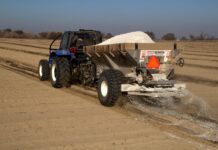
Through the first couple months of this year, we are painfully reminded it is an election year. Couple that with a looming $73 billion budget deficit, new leaders in the Assembly and Senate and the legislative outlook in California for 2024 promises to be very interesting. Will 2024 bring even more regulatory pressures to a state that is the most heavily regulated by far? Or will they find new ways to spend even more money, which does not seem to be a problem for a state that went from a $98 billion surplus in 2022 to a $73 billion shortfall less than two years later. The deadline to introduce new bills just passed, and more than 2,100 new bills were introduced with over 600 of those being spot bills, so we will have to wait to see what those hold in store.
One thing for sure: There is always one bill that makes you wonder what goes through the legislature’s mind in times like this. One might think it is water concerns, homelessness a $58 billion budget deficit, overregulation, etc. Well, this year, AB 2504 was introduced that would establish the Black Abalone as the “State Seashell,” which I am sure is vitally important because we don’t have one. And if you think that won’t be a big deal, wait until the Pacific Mussel or Pismo Clam supporters get wind of this. It might even cause an uprising or, at the very least, long committee hearings like those that occurred a few years ago when the California legislature named Augustynolophus Morrisi the State Dinosaur. Yes, the state legislature spends valuable time and money to debate and consider important, mission-critical issues like this.
Back to the real world, we have only had time to give a cursory review of the 2,100 new bills. Of these bills, several rise to the top of the concern lists with a ban on rodenticides, increased requirements for pesticides near schools, heat illness certification requirements and increased pesticide mill taxes. Potential opportunities might also exist with bills introduced to look at biomass, potential changes to classification of cargo thefts, exemptions for waste reporting for certain facilities and increased water storage. For now, I think it is important to take a deeper dive on what we know of some of the critical bills that have been newly introduced.
AB 1864 (Connolly)
This bill by Assemblyman Damon Connolly would require a county ag commissioner to require a notice of intent to be submitted before a person applies a pesticide within a quarter mile of a school site as specified. The bill would require the Department of Pesticide Regulation (DPR) to require a separate site identification number for the portion of an agricultural field that lies within a quarter mile of a school site. The bill would also require DPR to modify and amend permit applications to include reporting on the specific method of applying the pesticide and the exact date and time of the start and end of the period during which the pesticide is to be applied. The bill would require the director to expand the scope of specified related regulations to also apply to private schools serving pupils in kindergarten or any of grades 1 to 12.
AB 2264 (Arambula)
This bill by Assemblyman Joaquin Arambula would, commencing July 1, 2028, requires an employee to obtain a heat illness prevention certification from the division within 30 days after the date of hire and to maintain a valid certification for the duration of their employment as specified. The bill would require the Division of Occupational Safety and Health to develop and make accessible the heat illness prevention certification process on its internet website by July 1, 2028 and to offer the certification process in English and in the five most-used non-English languages.
AB 2552 (Friedman)
This is a bill by Assemblywoman Laura Friedman that would expand the definition of a wildlife habitat area to include open-space land. The bill would additionally prohibit the use of a second-generation anticoagulant rodenticide (SGAR) within 5,000 feet of a wildlife habitat area and prohibit the use of a first-generation anticoagulant rodenticide (FGAR) in or within 5,000 feet of a wildlife habitat area. The bill would prohibit the use of chlorophacinone or warfarin. This bill would make a person who sells or uses a SGAR or FGAR in violation of the aforementioned provisions liable for a civil penalty not to exceed $25,000 per day for each violation, in addition to any other penalty established by law. The bill would authorize any person to commence a civil suit to enjoin a person who is alleged to be in violation of the aforementioned provisions as specified. This bill is unprecedented and would give citizens unprecedented authority. The Association is actively opposing this far-reaching legislation.
AB 2658 (Bains)
This is an Association-sponsored bill carried by Assemblywoman Jasmeet Bains to provide an exemption for tree nut facilities from the SB 1383 waste reduction reporting requirements. Currently, some counties are requiring tree nut hullers and/or processors to register with the county and to report the food waste they send to a landfill, even if they don’t send anything. In some counties such as Tehama, this includes fees. The Association is actively fighting that requirement, and this legislation will exempt these facilities from that requirement.
SB 1153 (Hurtado)
This a bill by Senator Melissa Hurtado that would prohibit a hedge fund from purchasing, acquiring, leasing or holding a controlling interest, as defined, in agricultural land within the State of California. The bill would define a “hedge fund,” for these purposes, to mean a privately offered investment vehicle, foreign or domestic, that pools the contributions of private investors to invest in a variety of asset classes, such as securities, futures contracts, options, bonds, currencies, real estate, agricultural land, water, energy and other resources or commodities. This bill would exempt from this prohibition any agricultural land held by a hedge fund before the bill’s effective date. The bill would make land transferred in violation of these provisions subject to divestiture as specified.
SB 1374 (Becker)
This bill by Senator Josh Becker would require, no later than July 1, 2025, the California Public Utilities Commission (CPUC) to ensure any contract or tariff established by the commission pursuant to the aforementioned provisions for renewable electrical generation facilities configured to serve either multiple customers with meters on a single property, or multiple meters of a single customer on a property or a set of contiguous properties owned, leased or rented by the customer, meets certain requirements including that the eligible customer-generators may elect to aggregate the electrical load as specified. It is hoped this bill can fix the hole left behind this past year when CPUC eliminated “aggregation” for purposes of net energy metering, which is the only way agricultural farms even had a fighting chance to use solar in the future.
New Leadership
Senator Mike McGuire (2nd) is the new Senate Pro Tempore taking over from Senator Toni Atkins, who is stepping down as Pro Tem to focus on running for Governor. Senator McGuire represents the North Coast of California, and we will have to see how Senator McGuire handles ag issues at this level. Meanwhile, the Assembly has a new Speaker as Assemblyman Robert Rivas (29th) has replaced outgoing Speaker Anthony Rendon. It was no secret that Assemblyman Rendon didn’t have a real affinity for agriculture. Assemblyman Rivas represents the Salinas Valley and Watsonville areas, so agriculture should be at or near the top of his interests, as will labor issues.
To wrap this up, this was a small subset of legislation that was introduced, and we are still combing through the bills to make sure we understand all their intended goals or how they might be modified to impact agriculture. Stay tuned for further updates as the legislative session continues throughout 2024. Meanwhile, take comfort in knowing we will have a state seashell named when it is over.

By Roger A. Isom | President/CEO, Western Agricultural Processors Association
Roger is President/CEO of the California Cotton Ginners and Growers Association and Western Tree Nut Association. He brings over 30 years of regulatory and legislative advocacy experience, specializing in environmental and safety matters. Roger’s responsibilities include the management of both Associations’ staff and day-to-day operations. Roger is also the President of the Ag Energy Consumers Association (AECA), board member and Past President of the Ag One Foundation at California State University Fresno, and manages the Navel Orangeworm Action Committee (NOWAC).















